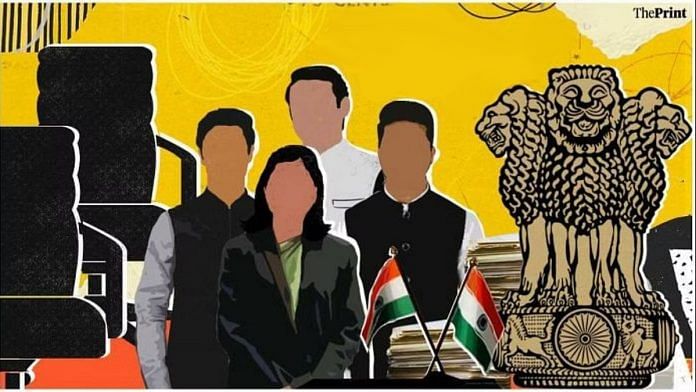New Delhi: At a time when Indian Administrative Service (IAS) representation at the joint secretary level in the central government is at an all-time low, 25 officers of the service have been appointed to the key post out of a total of 41 appointments made by the government Wednesday.
While the number is still low, given that IAS officers had a near-monopoly over the post until a few years ago, serving officers told ThePrint that there has been an attempt in the past few months to empanel more IAS officers, so as not to “let go” of the central postings completely.
In October last year, ThePrint had reported that the percentage of IAS officers appointed as joint secretary to the Government of India had fallen to just 33 percent—an all-time low for what has been considered the most prestigious of the country’s civil services for decades.
With more than 60 percent of appointments going to IAS officers, officials said the move is the result of some recalibration in the approach to central postings.
“There was a feeling among the IAS community that it would not be good for both the country and the service if IAS officers stop coming to the Centre altogether,” said a senior IAS officer serving in the Centre. “So, a larger number of IAS officers were empaneled, and subsequently, a larger number have been appointed.”
“Even now, the numbers are not very high compared to what they used to be, but there is at least an uptick,” the officer added.
Among the 25 IAS officers appointed, four are from Gujarat, three from Bihar, two each from Uttar Pradesh, Tamil Nadu, Chhattisgarh and Rajasthan, and one each from Kerala, Karnataka, Odisha, Punjab, Assam-Mizoram, Himachal Pradesh, Nagaland, Tripura, Manipur and the Union Territory cadre.
In line with the trend of few officers from West Bengal coming to the Centre on deputation, no officer from the cadre has been appointed.
‘A recalibration’
According to IAS officers, there has been an attempt under the present government to reduce the “monopoly” of IAS officers in central postings, especially at higher levels.
This, some say, is a way to increase centralisation of power since allied services like the railways and revenue only report to the Centre, and thus, do not have “split loyalties”.
However, there has also been a trend of IAS officers not opting for central deputation themselves.
“This is a completely different scenario from our times,” said former IAS officer T.R. Raghunandan. “At our times, there was a stiff competition to come to the Centre, and it was considered a matter of pride to be appointed as joint secretary,” he said.
“It was also a time when the joint secretary was arguably the most important person in a ministry after the minister,” he said.
“Secretaries would stay in the post for 1-2 years, additional secretaries were seen as nothing but secretaries-in-waiting… So, the actual policy-making was done by joint secretaries, who would spend as long as five years in the same position,” he added.
“Now, things are different… The charm of coming to the Centre has reduced. People seem to be very happy to stay in the comforts of their states, where the perks are far more than in the Centre.”
However, K.B.S. Sidhu, another former IAS officer, said that the recent appointments make it amply clear that there has been some kind of recalibration by the government.
“It seems to me that after trying officers from all other services, the government has realised that none match the field and multidisciplinary experience of IAS officers,” he said. “It is not a question of intelligence, but the experience of an IAS officer who would be eligible to become a JS after 16 years of service, would be far more diverse and ground-driven than that of an officer of, say, revenue, telecom, etc.”
“If the government has gone from 33 percent to 60 percent of IAS officers in the new round of appointments, it is clear that there has been some rethinking.”
However, a serving railways officer, who wished to remain anonymous, said the appointments are a result of a “backlash” from the IAS lobby.
“We had seen it coming. If you see the empanelments done in the last few months, IAS officers are everywhere… The problem is no matter how much you increase diversity, as long as they hold the key positions in the PMO, DoPT, etc., they cannot be displaced.”
However, it’s not a question of which service is appointed as joint secretary, said Raghunandan. “Becoming a JS is extremely enriching, difficult and demanding. If you do it well, you can do a lot for the country. If IAS officers stop becoming joint secretaries, it is really a loss to the service,” he said.
(Edited by Sugita Katyal)
Also read: Karnataka BJP MLC booked for ‘Pakistan’ remark on Muslim DM, state IAS association demands apology






